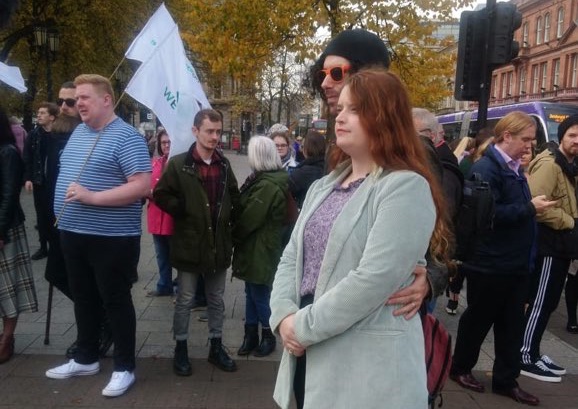
The British government has been accused of deliberately failing to implement the provisions of Good Friday Agreement in its domestic law following an appeals court ruling which found that an Irish woman from County Derry is legally British and not Irish.
An appeal brought by the British government’s Home Office overturned an immigration tribunal decision which found that people born in the Six Counties have the right to be considered Irish.
The original case was brought by Emma DeSouza, from Magherafelt in County Derry, who was told by British officials that she must first make an application to renounce her “default” British citizenship before she can be considered Irish in the eyes of their law. The application must be accompanied by a payment of £372 and be otherwise acceptable to the authorities.
The issue arose when Ms DeSouza applied for a residence card for her US-born husband. Having always considered herself Irish, she made the application identifying herself as an Irish citizen. The County Derry woman argued that she never considered herself British, so how could she renounce citizenship she never had.
The case could have major implications for the rights of Irish people in the Six Counties in the aftermath of Brexit. Ms DeSouza revealed the outcome of the appeal at a press conference in Belfast this week. She insisted her legal battle would go on.
“After four years it’s safe to say we won’t be lying down anytime soon,” she said.
Ms DeSouza pointed out the Home Office position ran contrary to the 1998 Good Friday peace agreement, which explicitly gives anyone from the Six Counties the right to identify as British, Irish or both.
British government lawyers argued that the Good Friday Agreement had no legislative effect, as successive British governments had not implemented the Agreement’s provisions on citizenship into legislation. They said current legislation dictates and that anyone born in the north of Ireland is automatically British, until such time as they renounce that citizenship.
Ms DeSouza said Britain’s hardline approach was an attempt to block access to key EU entitlements in the north of Ireland and vowed to take her case to the Court of Appeal in Belfast.
“After four years it’s safe to say we won’t be lying down anytime soon,” she said.
“During that time we have had a lot of personal losses, we have lost family members, we have lost time with our families, we have lost opportunities, we have lost the first four years of our marriage, so we are certainly not going to go quietly into night with this decision - a decision that really goes against the spirit and purpose of the Good Friday Agreement.”
During the stand-off, which dates from 2015, the Home Office retained her husband’s passport for two years - a move that forced him to quit his job and prevented him from attending his grandmother’s funeral in the US.
The Irish Taoiseach Leo Varadkar has claimed to have received a British pledge to review rules around citizenship. Ms DeSouza said she was frustrated that he still refers to the British government review.
“There is no review,” she said. “And yesterday’s judgement makes clear that the British government have no intention of seeking a resolution.
“This is not to say that we don’t appreciate the work and support of both the Taoiseach and Tánaiste on this but, the Irish government has been following up on this review for eight months.
“Whilst the British government continues to appeal against us. It’s not enough.”
Sinn Féin MP Elisha McCallion has said the British government cannot be allowed to trample over the rights of Irish citizens and the Good Friday Agreement.
Speaking after addressing a rally in Guildhall Square, she said: “No British court will tell us that we have to identify as British rather than Irish. We need to see an end to British government reneging on Good Friday Agreement commitments.”
![[Irish Republican News]](https://republican-news.org/graphics/title_gifs/rn.gif)
![[Irish Republican News]](https://republican-news.org/graphics/title_gifs/harp.gif)

